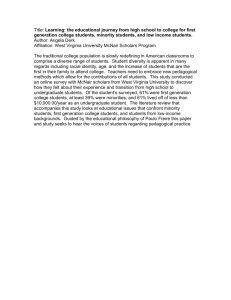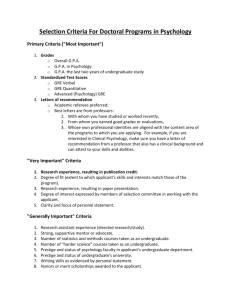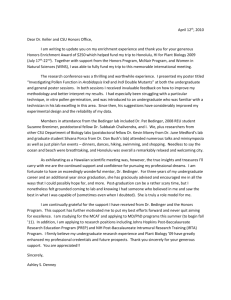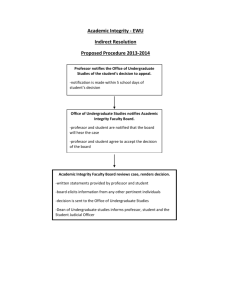Southern Miss Department of Psychology 2015
advertisement
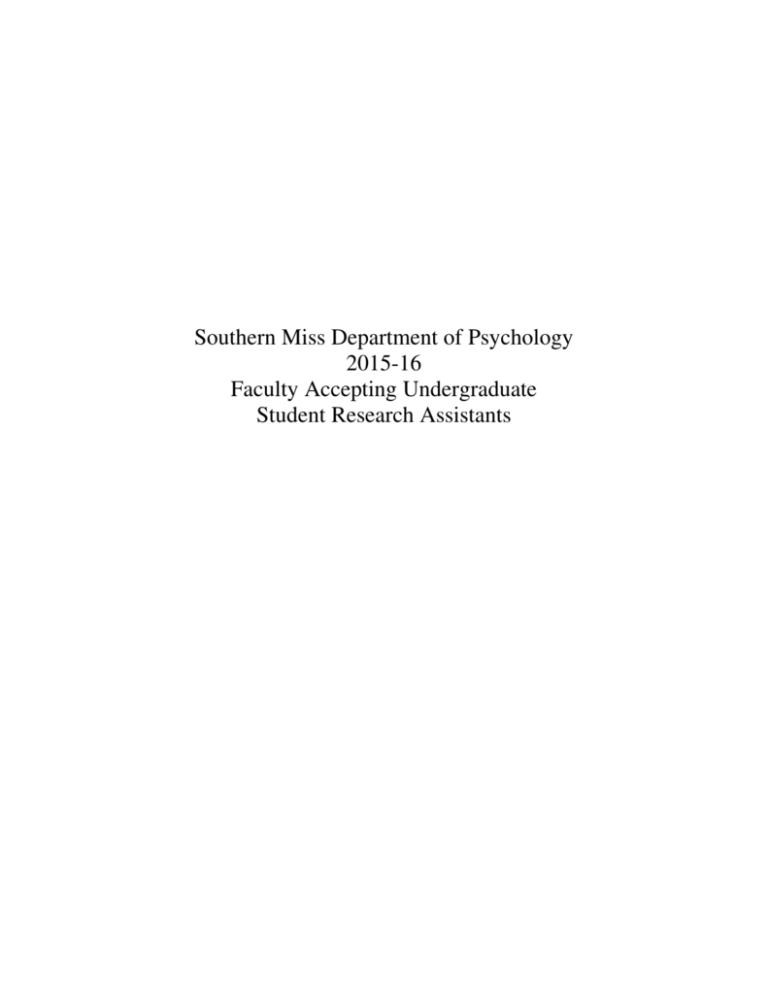
Southern Miss Department of Psychology 2015-16 Faculty Accepting Undergraduate Student Research Assistants Adolescent Risky Behaviors Lab Faculty Member: Dr. Nora Charles Program: Clinical Psychology Email: nora.charles@usm.edu Research Focus: Externalizing behaviors such and aggression and other kinds of acting out in children and adolescents, risk-taking during adolescence and young adulthood, the development of substance use disorders, the effects of stress on children and adolescents, and community-based interventions for at-risk youth Undergraduate research activities available: Data collection (administering questionnaires, directing participants in activities, conducting interviews with children and parents), data scoring & entry (typically entering data into a spreadsheet), project management (recruiting participants, scheduling appointments, maintaining study supplies). Undergraduates who are successful in these activities have the opportunity to work with the faculty member to design new studies, perform statistical analyses, present results at scientific meetings, and publish in scientific journals. Successful undergraduates in the lab are: Organized, responsible, comfortable working directly with study participants, able to ask for help when needed, and excited about research! Number of undergraduate research assistants available: 2 Willing to offer PSY 491 research credits: Yes Supervise Honors College, McNair & Senior Theses: Yes Requirements: GPA > 3.0 or higher, Sophomore standing or higher Interest in pursuing graduate school in psychology or a related discipline is preferred Email the faculty member (nora.charles@usm.edu) if you are interested in joining the lab. Anger & Traffic Psychology Lab Faculty Member: Dr. Eric Dahlen Program: Counseling Psychology Email: Eric.Dahlen@usm.edu Website: http://anger-lab.com/ Research Focus: Basic and applied psychological research on dysfunctional anger, overt and relational aggression, clinical traffic psychology, and related areas. Much of our work focuses on the role of personality. For example, we have recently been exploring the role of “dark personality” variables (e.g., psychopathy, narcissism) in relational aggression and aggressive driving. Undergraduate research activities available Gain exposure to the full research process from project planning and initial literature review through conference presentation and publication. Specific activities will depend on the projects and need for assistance. Successful undergraduates in the lab are: Conscientious Punctual Hard working Number of undergraduate research assistants available: 2-3 Willing to offer PSY 491 research credits: Yes Supervise Honors College, McNair & Senior Theses: Yes – research interests need to match the lab. Requirements: Minimum GPA of 3.0 Attendance at weekly lab meetings Willingness to complete university-required online human subjects research training Psychology major preferred Visit the Anger & Traffic Psychology Lab Webpage for additional information. Anxiety & Trauma Research Clinic (ATRC) Faculty Member Dr. Dan Capron Program: Clinical Psychology Email: daniel.capron@usm.edu Research Focus Risk factors for anxiety and trauma related disorders Undergraduate research activities available Contacting, scheduling and running participants through computerized interventions Contacting, scheduling, and running participants through experimental studies using virtual reality technology Successful undergraduates in the lab are Reliable Detail-oriented Motivated Number of undergraduate research assistants available To be determined Willing to offer PSY 491 research credits: Yes Supervise Honors College, McNair & Senior Theses Yes if the project is appropriate to lab mission Requirements 3.5 GPA Behavior and Alcohol Research (BAR) Team Faculty Member: Dr. Michael Madson Program: Counseling Psychology Email: michael.madson@usm.edu Website: http://usmcart.weebly.com/ Research Focus: The focus of BAR research is on social-cognitive and behavioral predictors of college student harmful and safe drinking behaviors with an emphasis on protective behavioral strategies. We also evaluate the outcomes of a brief motivational intervention to reduce harm associated with college student drinking. Undergraduate research activities available Learn about the research process from reading literature to designing a study and presenting results. Attend weekly research meetings with graduate students. Develop skill in using behavioral rating forms to code counseling sessions Participate in national college alcohol awareness week at USM Bi-weekly journal club Receive mentoring from graduate students Successful undergraduates in the lab Conscientious, dependable, ethical Good team player Willing to learn about lab topics and research Interested in seeking graduate school Good communicator Fun Number of undergraduate research assistants available: 2-3 Willing to offer PSY 491 research credits: Yes Supervise Honors College, McNair & Senior Theses: Yes Requirements: Psychology major Minimum GPA of 3.0 Attendance at weekly lab meetings At least 1 year left before to graduation Behavioral Neuroscience Laboratory Faculty Member Name: Dr. David Echevarria Program: Experimental/Brain and Behavior Email: david.echevarria@usm.edu Research Focus Stress, learning, addiction, and sleep using a zebrafish model Undergraduate research activities available Data collection, coding video, breeding and maintaining zebrafish, and general caring for zebrafish Number of undergraduate research assistants available We typically have 3-4 students as part of our research team Willing to offer PSY 491 research credits Yes Supervise Honors College, McNair & Senior Theses Yes Requirements: We seek hard working and dedicated individuals Apply through www.zebrafishscience.com Childhood Neuropsychiatric Disorders & Electrophysiology Lab Faculty Member: Stephanie D. Smith Program: Clinical Psychology Email: SD.Smith@usm.edu Research Focus: Child psychopathology ADHD Aggression & disruptive behaviors Treatment outcome studies Neural mechanisms of change (electrophysiology) Undergraduate research activities available: Participant recruitment Data entry Training on how to administer/score basic symptom checklists Training on how to assist in running EEG (electroencephalogram) subjects (i.e., assisting with net placement & impedances) Successful undergraduates in the lab are: Motivated Take the initiative Independent Detail-oriented Seek appropriate supervision Number of undergraduate research assistants available: 2 Willing to offer PSY 491 research credits: Yes Supervise Honors College, McNair & Senior Theses: Yes Requirements: Junior or Senior Prior experience working in research setting and with children (preferable if experience is with clinical populations) Evolutionary Social Psychology Laboratory (ESPL) Faculty Member: Dr. Donald Sacco Program: Brain and Behavior Email: Donald.Sacco@usm.edu. Research Focus: My research focuses on how natural and sexual selection have shaped human cognition and behavior, particularly social behavior. Specific research in the ESPL focuses on understanding the evolutionary psychology of human social cognition as it relates to sexual behavior (e.g., short-term versus long term-mating), personality (e.g., sociosexuality), group dynamics (e.g., social inclusion and exclusion, cheater detection), and stigmatization (e.g., based on disease avoidance concerns). Undergraduate research activities available Undergraduate research assistants begin their work in the lab by completing research ethics training and training with data collection software in the lab. Students who demonstrate high aptitude with these responsibilities have the opportunity to conduct independent research projects should they have interest in doing so. Students are responsible to read one article a week that is discussed during weekly lab meetings Successful undergraduates in the lab Conscientious Self-motivated Number of undergraduate research assistants available: 3-5 Willing to offer PSY 491 research credits: Yes Supervise Honors College, McNair & Senior Theses: Yes Requirements: Basic background in psychology (e.g., have completed Introduction to Psychology) Demonstrate an interest in how evolutionary biology informs human psychology. Must have at least a 3.0 GPA. Must be able to devote approximately 10 hrs/week to data collection in the lab Must be available for a weekly lab meeting. Interested students can contact me via email to complete a formal lab application to be reviewed. Research assistant positions in the ESPL are competitive; as such, completing an application to work in the lab does not guarantee that a person will obtain a research assistant position. Human Operant Evaluation and Performance (HOPE) Lab Faculty Member: Dr. James W. Moore, Program: Applied Behavior Analysis Program Email: james.moore@usm.edu Research Focus: Applied behavior analysis, particularly stimulus preference, self-control/impulsivity (known in our field as temporal discounting), and reinforce effectiveness. We will also conduct practicedriven research with children with Autism. Undergraduate research activities available Presentation, team research meetings, materials preparation, and acting as the therapist with children once they have sufficient training Successful undergraduates in the lab Interest in the behavioral orientation Number of undergraduate research assistants available: Up to 10 Willing to offer PSY 491 research credits: Yes Supervise Honors College, McNair & Senior Theses: Yes Requirements: Case-by-case basis. Marine Mammal Behavior and Cognition Lab Faculty Member: Dr. Stan Kuczaj Program: Brain and Behavior Email: s.kuczaj@usm.edu Research Focus: Dolphin social behavior and communication. Undergraduate research activities available Coding and analyzing data Successful undergraduates in the lab Hard working Dependable Motivated Number of undergraduate research assistants available: 1 Willing to offer PSY 491 research credits: Yes Supervise Honors College, McNair & Senior Theses: Yes Requirements: Individual interview Memory for Parents Faculty Member: Lawrence Patihis Program: Brain and Behavior Email: L.Patihis@usm.edu Research Focus: Memory for Parents Undergraduate research activities available Literature reviews Lab meetings Learning experiment planning Running participants through experiments Statistics, database management, Learning and using Qualtrics, Sona, Excel, SPSS, Word, and Powerpoint Poster presentations Possible scientific conferences Research assistants must be able to genuinely contribute 6 hours per week for the 3 units of PSY 491 (or PSY 498 if applicants are doing a written project for their senior thesis) they receive. Some work is in the lab (e.g. meetings and running participants) while other work can be done away from the lab (e.g. literature searches). Successful undergraduates in the lab are: Those that are aiming for a research career in psychology, or those aiming to teach and research. Number of undergraduate research assistants available: 6 Willing to offer PSY 491 research credits: Yes Supervise Honors College, McNair & Senior Theses: Yes, I will be very happy to be the supervising professor on undergraduate projects as long as I am able to guide the project from the design stage onward, and that the projects are conducted in the realm of my current research program which is Memory for Parents. Requirements: 3.50 GPA or above in the last two years (of college or high school if they are freshmen). Aiming to go to graduate school in research psychology Those strong in statistics are especially welcome. Perception Action and Cognition Lab Faculty Member: Dr. Alen Hajnal Program: Brain and Behavior Psychology Email: Alen.hajnal@usm.edu Research Focus: We study visual and haptic perception of 3D space. The lab conducts behavioral experiments using state-of-the-art motion capture equipment that is typically used in the movie industry for creating animations. Cross disciplinary topics include suicide prevention studies using virtual reality technology (Oculus Rift). Undergraduate research activities available Run experiments Data processing Statistical analyses Writing manuscripts Successful undergraduates in the lab are Stick to lab schedule Good team player Dependable, honest, has integrity Willing to learn new quantitative research skills (stats, research design) Number of undergraduate research assistants available: 2-3 Willing to offer PSY 491 research credits: Yes Supervise Honors College, McNair & Senior Theses: Yes if in lab focus area Requirements: 3.0 GPA or above preferred PSY360) and/or PSY361) with at least a B grade Research experience is a must for graduate school applications. I train students to adopt rigorous research standards and procedures. Personality, Assessment, & Clinical Outcomes Faculty Member: Dr. Joye Anestis Program: Clinical Psychology Email: joye.anestis@usm.edu Research Focus: Externalizing psychopathology Assessment Predictors of treatment outcome Undergraduate research activities available Data entry Data collection Research papers if interested and motivated Successful undergraduates in the lab Initiative Responsible Reliable Number of undergraduate research assistants available: 2-3 Willing to offer PSY 491 research credits: Yes Supervise Honors College, McNair & Senior Theses: Yes Requirements: Minimum GPA 3.0 PPRT: Positive Parenting Research Team Faculty Member: Dr. Bonnie Nicholson Program: Counseling Psychology Email: bonnie.nichoslon@usm.edu Research Focus: Factors associated with parenting success Overparenting/ helicopter parenting and emerging adults Undergraduate research activities available Data collection Literature reviews Writing Reviewing manuscripts Assist with preparation of research presentations Successful undergraduates in the lab Flexibility Strong work ethic Number of undergraduate research assistants available: 1-2 Willing to offer PSY 491 research credits: Yes Supervise Honors College, McNair & Senior Theses: No Requirements: Review of transcript & writing sample Preventing Emotional Disturbance in Children Faculty Member: Dr. Brad Dufrene Program: School Psychology Email: brad.dufrene@usm.edu Research Focus: Tiered interventions and consultation procedures aimed at preventing emotional disturbance in children that experience health disparities Undergraduate research activities available Conduct direct-observations of child behavior in applied settings such as the clinic and/or schools Shadow advanced graduate students during teacher interviews and/or therapy sessions Successful undergraduates in the lab Strong work ethic Dependability Number of undergraduate research assistants available: TBD Willing to offer PSY 491 research credits: Yes Supervise Honors College, McNair & Senior Theses: Yes Requirements: Interview Preference to those who have taken applied behavioral analysis/behavioral interventions Social Cognition and Behavior Lab Faculty Member: Dr. Dr. Elena Stepanova Program: Brain and Behavior Email: Elena.Stepanova@USM.edu Research Focus: Physical Appearance and Impression Formation in Black Communities Racial Bias in Elementary School Children Cross-cultural Differences in Facial Categorization Effects of Facial Features on Social Biases and Categorization. Undergraduate research activities available Conduct experiments Record, code and analyze data. Successful undergraduates in the lab Reliability Number of undergraduate research assistants available: 1-2 for Spring or summer 2016 Willing to offer PSY 491 research credits: Yes Supervise Honors College, McNair & Senior Theses: Yes Requirements: GPA of 3.0 and above Commitment to two semesters of lab work Southern Miss Autism Research and Treatment (SMART) Lab Faculty Member: Dr. Keith Radley Program: School Psychology Email: keith.radley@usm.edu Research Focus: Behavioral interventions for individuals with autism spectrum disorder; school-based interventions for problem behaviors Undergraduate research activities available Data collection Implementation of interventions Successful students in the lab are: Dependable & motivated Have good interpersonal skills Interested in working directly with children, teachers, and parents to improve the wellbeing of children with disabilities. Number of undergraduate research assistants available: 3-5 Willing to offer PSY 491 research credits: Yes Supervise Honors College, McNair & Senior Theses: Yes Requirements: Some level of availability during school hours (i.e., 7:00 am to 3:00 pm) Individuals interested in working with children with problem behaviors and/or disabilities Vocational Psychology Faculty Member: Dr. Emily Yowell Program: Counseling Psychology Email: emily.yowell@usm.edu Website: www.usm.edu/counseling-psychology/faculty/emily-yowell Research Focus: The practical application of career-related assistance in people’s lives. Projects involve the exploration career interests, career assessment, career decision-making, career thinking, and career self-efficacy in populations ranging from college students to military veterans. Undergraduate research activities available Undergraduate members can be engaged at research from conception to data collection/analysis to presentation. There are also opportunities to support the work of graduate students. Successful students in the lab are: Curiosity and responsibility Number of undergraduate research assistants available: 1-2 Willing to offer PSY 491 research credits: No Supervise Honors College, McNair & Senior Theses: Not this semester Requirements: No specific requirements

